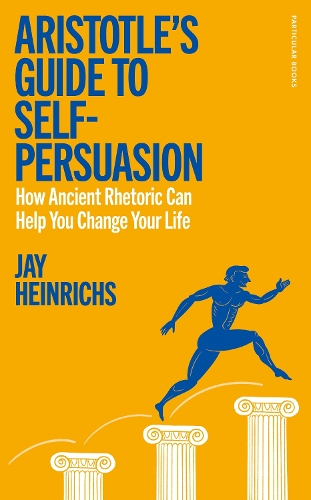
Aristotle's Guide to Self-Persuasion: How Ancient Rhetoric Can Help You Change Your Life
(Hardback)
Publishing Details
Aristotle's Guide to Self-Persuasion: How Ancient Rhetoric Can Help You Change Your Life
By (Author) Jay Heinrichs
Penguin Books Ltd
Particular Books
14th October 2025
15th July 2025
United Kingdom
Classifications
General
Non Fiction
Popular philosophy
Interpersonal communication and skills
Memoirs
168
Physical Properties
Hardback
288
Width 143mm, Height 224mm, Spine 27mm
389g
Description
Show yourself who's in charge using the original art of persuasion - from the New York Times bestselling author of Thank You for Arguing Rhetoric once sat at the centre of elite education. Alexander the Great, Shakespeare and Martin Luther King, Jr. used it to build empires, write deathless literature and inspire democracies. Here, Heinrichs shows us how these persuasive tools, invented by the like of Aristotle and Cicero, and honed over more than three thousand years, can sway your most difficult audience- yourself. Illustrated with examples from history and pop culture - Winston Churchill, Iron Man, Dolly Parton, and the woman who serendipitously invented the chocolate chip cookie - Aristotle's Guide to Self-Persuasion tests the tools of persuasion and asks- Can the same techniques that seduce lovers, sell diet books and overturn governments help us achieve our most desired goals Filled with entertaining and scientific studies that showcase the life-changing power of language, Aristotle's Guide to Self-Persuasion will teach you how to be the most successful person you can be, just by talking to yourself.
Reviews
Praise for Jay Heinrichs:
Thankfully, Mr Jay Heinrichs is here, to explain how rhetoric can help you win more in life, and generally have a more harmonious relationship with people around you
Jay Heinrichs knows a thing or two about arguing * The Times *
Colourful, instructive, illuminating... a romp through the rules of rhetoric * Guardian *
Jay Heinrichs is one of the worlds leading students of Aristotelian rhetoric * Bloomberg *
Author Bio
Jay Heinrichs is the bestselling author of Thank You for Arguing and How to Argue with a Cat. He has written for dozens of publications, including The New York Times magazine, Vice and the Huffington Post, and won numerous journalism awards. He has taught persuasion to college and university editors at Ivy League universities, NASA and the Pentagon. He runs the acclaimed blog Figarospeech.com, as well as the rhetoric site ArgueLab.com.
